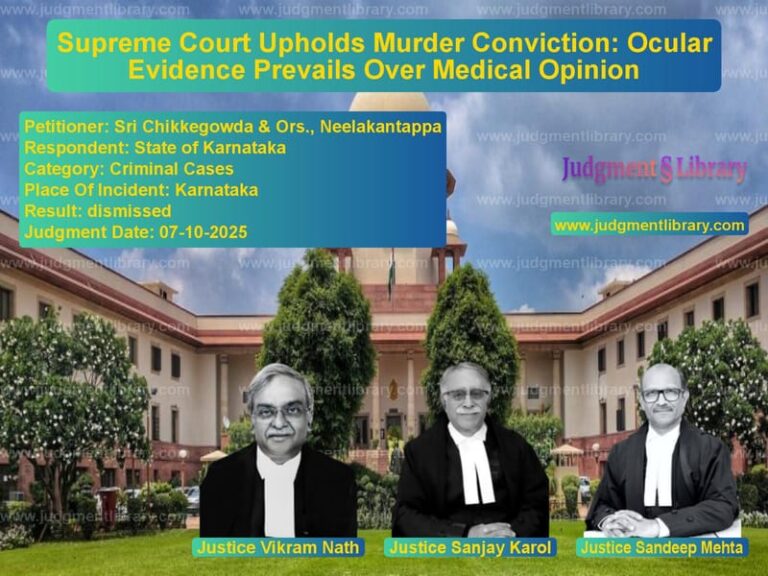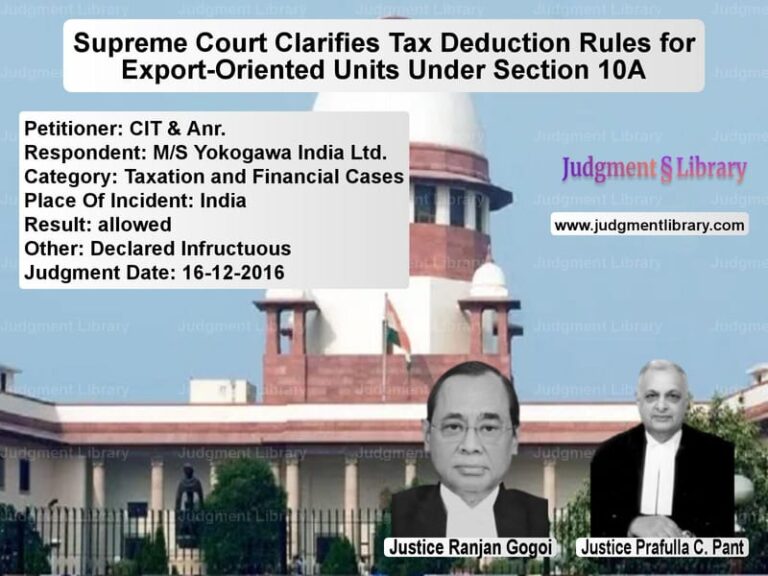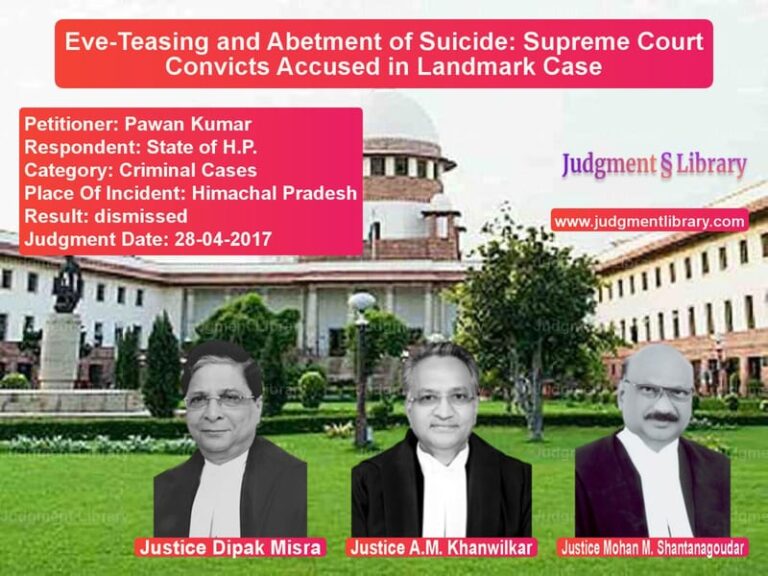Bail in UAPA Cases: Supreme Court’s Landmark Ruling on K.A. Najeeb
The case of Union of India v. K.A. Najeeb is a significant ruling regarding the balance between the right to personal liberty and stringent anti-terror laws under the Unlawful Activities (Prevention) Act, 1967 (UAPA). The Supreme Court was tasked with determining whether a person accused of terrorism-related activities under UAPA could be granted bail despite the restrictive provisions of the Act.
The appeal was filed by the Union of India against an order of the Kerala High Court, which granted bail to the respondent, K.A. Najeeb. The case arose from a 2010 attack on Professor T.J. Joseph in Kerala, where the victim’s right palm was chopped off by members of the Popular Front of India (PFI) as revenge for allegedly blasphemous content in a college exam paper. The respondent, who was accused of being one of the main conspirators, had absconded for years before being arrested in 2015. He remained in jail for over five years without trial, leading the High Court to grant him bail. The Union of India, through the National Investigation Agency (NIA), challenged this order in the Supreme Court.
Background of the Case
The case originated from an incident on July 4, 2010, when a group of people attacked Professor T.J. Joseph in Kerala. The attackers intercepted his car, dragged him out, and chopped off his right palm using sharp weapons. They also threw country-made bombs to create panic and prevent intervention.
An FIR was filed against the attackers under several provisions of the Indian Penal Code (IPC), Explosive Substances Act, and UAPA. The respondent, K.A. Najeeb, was accused of being one of the key conspirators, facilitating the attack, arranging vehicles and SIM cards, and aiding the perpetrators before and after the attack. However, he evaded arrest for five years and was only taken into custody on April 10, 2015.
Arguments by the Petitioner (Union of India)
The Union of India, represented by the National Investigation Agency (NIA), argued:
- The Kerala High Court erred in granting bail without considering the stringent provisions of Section 43-D(5) of UAPA, which mandates that bail cannot be granted if the prosecution has a prima facie case.
- The respondent had absconded for five years, demonstrating a high likelihood of fleeing again if released on bail.
- Several courts, including the Special NIA Court and the High Court, had previously denied bail, citing strong prima facie evidence against him.
- There were still 276 witnesses to be examined in the trial, and releasing the accused could allow him to tamper with evidence.
- The seriousness of the crime required strict adherence to the anti-terror law, and the High Court failed to consider national security concerns.
Arguments by the Respondent (K.A. Najeeb)
The respondent’s counsel argued:
- He had already been in jail for over five years without trial, violating his fundamental right to a speedy trial under Article 21 of the Constitution.
- Many of his co-accused had either been acquitted or had received sentences not exceeding eight years. Given that he had already served most of this period, continued detention was unjust.
- Even under strict laws like the Terrorist and Disruptive Activities (Prevention) Act (TADA) and the Narcotic Drugs and Psychotropic Substances Act (NDPS), prolonged incarceration without trial had been deemed unconstitutional.
- There was no credible evidence that he would tamper with witnesses or flee.
- Courts have previously ruled that bail can be granted in special cases where trial delays violate constitutional rights.
Supreme Court’s Analysis
The Supreme Court examined whether the High Court was justified in granting bail despite the strict bail conditions under UAPA. The Court made the following key observations:
1. Right to a Speedy Trial vs. National Security
The Court emphasized the importance of balancing national security concerns with the accused’s fundamental rights. It ruled:
“While stringent laws like UAPA are necessary for combating terrorism, they cannot be used to violate fundamental rights, including the right to a speedy trial.”
2. Prolonged Incarceration Without Trial
The Court noted that the respondent had already spent five years and five months in custody, yet trial proceedings had barely begun. Citing precedents from earlier cases, it stated:
“Courts have consistently held that prolonged incarceration without trial is unconstitutional, particularly when the accused has already served a significant portion of the expected sentence.”
3. Applicability of Section 43-D(5) of UAPA
Addressing the government’s argument that UAPA prohibits bail, the Court ruled:
“The presence of statutory restrictions like Section 43-D(5) does not oust the ability of Constitutional Courts to grant bail where fundamental rights are at stake.”
The Court clarified that while anti-terror laws require a stringent approach, they must be applied in a manner consistent with constitutional guarantees.
Final Judgment
The Supreme Court upheld the Kerala High Court’s decision and granted bail to the respondent with strict conditions:
- The respondent must report to the local police station every Monday.
- He must not engage in any activity that incites communal tensions.
- If he attempts to tamper with evidence or influence witnesses, the Special Court has the right to cancel his bail immediately.
Legal Significance
This judgment sets a vital precedent in cases involving stringent anti-terror laws:
- Speedy Trial is a Fundamental Right: Even under laws like UAPA, prolonged detention without trial is unconstitutional.
- Constitutional Courts Have Discretion: Courts can override strict bail provisions if constitutional rights are being violated.
- Judicial Oversight in Anti-Terror Cases: The judiciary must ensure that national security measures do not lead to undue human rights violations.
The ruling reinforces that while terrorism laws are necessary, they must be balanced with individual liberties to ensure justice is served fairly.
Petitioner Name: Union of India.Respondent Name: K.A. Najeeb.Judgment By: Justice N.V. Ramana, Justice Surya Kant, Justice Aniruddha Bose.Place Of Incident: Kerala.Judgment Date: 01-02-2021.
Don’t miss out on the full details! Download the complete judgment in PDF format below and gain valuable insights instantly!
Download Judgment: union-of-india-vs-k.a.-najeeb-supreme-court-of-india-judgment-dated-01-02-2021.pdf
Directly Download Judgment: Directly download this Judgment
See all petitions in Bail and Anticipatory Bail
See all petitions in Terrorist Activities
See all petitions in Judgment by N.V. Ramana
See all petitions in Judgment by Surya Kant
See all petitions in Judgment by Aniruddha Bose
See all petitions in dismissed
See all petitions in Stayed
See all petitions in supreme court of India judgments February 2021
See all petitions in 2021 judgments
See all posts in Criminal Cases Category
See all allowed petitions in Criminal Cases Category
See all Dismissed petitions in Criminal Cases Category
See all partially allowed petitions in Criminal Cases Category







